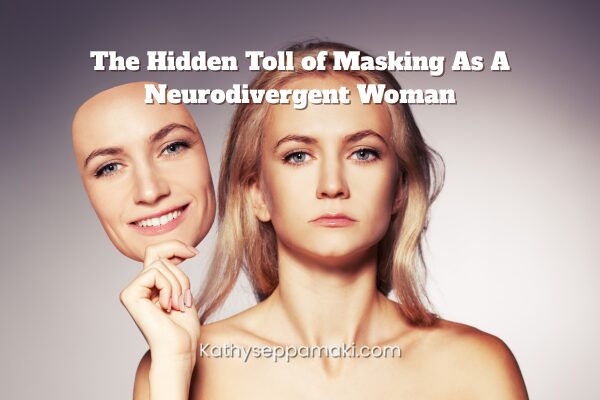‘For many neurodivergent women, especially those with ADHD or autism, life has often been about survival rather than authenticity. And one of the biggest survival strategies is masking.
Masking is the act of camouflaging your natural thoughts, behaviors, and responses to fit in with the neurotypical expectations of others. It’s learning to smile when you’re overwhelmed, forcing eye contact even when it feels unnatural, stifling your stims, copying social cues, and suppressing your real needs. It’s trying so hard to be “normal” that you lose track of who you actually are.
For neurodivergent women, especially those undiagnosed for decades, masking often begins in childhood and becomes second nature by adulthood. But over time, the toll becomes undeniable.
The most common struggles women face after a lifetime of masking
Chronic exhaustion
Masking is mentally and emotionally draining. Constantly monitoring your behavior, scripting conversations, managing facial expressions, and pretending to be “on” takes a massive toll. Many women report feeling completely depleted at the end of the day, even if they haven’t done anything physically demanding. It’s not laziness. It’s burnout from a lifetime of pretending.
Loss of identity
When you spend your life performing a version of yourself that others find more acceptable, it becomes harder to know who you really are. Many women hit midlife and realize they don’t know what they like, what they need, or who they are without the mask. That identity crisis can be both heartbreaking and liberating.
Mental health struggles
Depression. Anxiety. Rejection Sensitive Dysphoria. Many neurodivergent women have a history of being misdiagnosed with mood disorders because their autism or ADHD went unrecognized. The pressure to fit in and the emotional dissonance caused by masking often lead to long-term mental health challenges.
Autistic or ADHD burnout
Burnout doesn’t just happen from work or parenting—it can also come from years of overstimulation, emotional suppression, and unmet sensory needs. This type of burnout can be long-lasting and deeply debilitating. It’s not laziness or lack of motivation. It’s a shutdown of the nervous system that’s been overworked for far too long.
People-pleasing and boundary issues
Many neurodivergent women become expert people-pleasers, often at the expense of their own needs. When you’ve been trained (explicitly or implicitly) that your natural self isn’t “right,” it becomes dangerously easy to prioritize other people’s comfort over your own well-being. Setting boundaries often feels like a foreign language.
Late diagnoses and misunderstanding
Because of how well women tend to mask, many don’t receive a proper diagnosis until they’re well into adulthood, if ever. That means they’ve spent decades being misunderstood by others and often misunderstanding themselves. Relationships suffer, self-esteem plummets, and self-doubt becomes a constant companion.
Grief and anger
There is a deep grief that comes after realizing how much of your life was spent trying to be someone you’re not. It can feel like mourning the years lost to misunderstanding and unmet needs. Alongside the grief often comes anger—at society, at doctors who missed the signs, and even at yourself.
Healing after masking
The good news? Once you recognize how masking has impacted you, you can start unmasking.
Unmasking is a process of gently peeling back the layers of performance and rediscovering your authentic self. It involves:
-
Learning your true sensory and emotional needs
-
Reclaiming your identity and passions
-
Letting go of perfectionism
-
Setting boundaries, even when it’s hard
-
Finding safe spaces and people where you don’t have to pretend
You’re not broken. You were never too much. You were simply forced to fit into a world that didn’t understand you. But now, you get to write a new story—one rooted in self-compassion, authenticity, and healing.
Have you been masking most of your life?
What does unmasking look like for you? I’d love to hear your story in the comments. Let’s unmask together.




